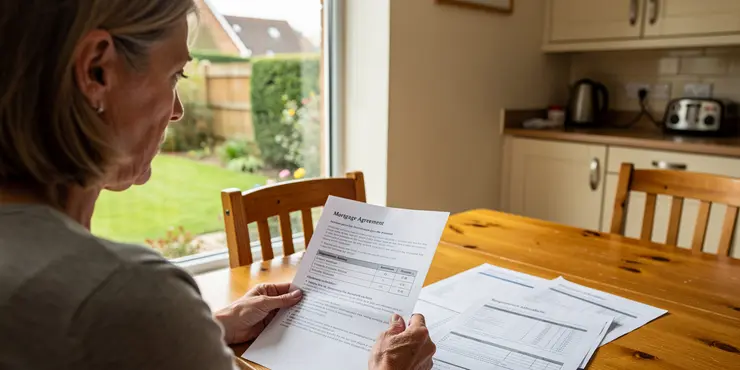
Find Help
More Items From Ergsy search
-

How do economic conditions influence interest rate changes?
Relevance: 100%
-

How do interest rate changes affect my mortgage payments?
Relevance: 66%
-

Major Banks Announce Changes in Interest Rates: Are You Affected?
Relevance: 65%
-

Why do interest rates rise and fall?
Relevance: 64%
-
What is an SVR and how does it relate to interest rate changes?
Relevance: 61%
-

Can my lender change my interest rate without notification?
Relevance: 60%
-

Are first-time buyers affected differently by interest rate changes?
Relevance: 60%
-

What is a tracker mortgage and how does it respond to interest rate changes?
Relevance: 59%
-

Can interest rates on student loans be reduced?
Relevance: 58%
-

Will my fixed-rate mortgage payments change with interest rate fluctuations?
Relevance: 57%
-

How can I protect myself from rising interest rates?
Relevance: 47%
-

How often do wage rates change in the UK?
Relevance: 47%
-

What happens to my monthly payments if interest rates rise?
Relevance: 47%
-

Is there a change in National Insurance rates for 2026?
Relevance: 46%
-

Is it possible to switch my mortgage type if interest rates become unfavourable?
Relevance: 46%
-

How do better interest rates help me save money?
Relevance: 45%
-

How does interest rate affect my car finance agreement?
Relevance: 45%
-

Will there be a change in the additional rate threshold in April 2026?
Relevance: 45%
-

How do better interest rates help me save money?
Relevance: 43%
-

Is there any interest charged on a Time to Pay arrangement?
Relevance: 39%
-

How often do interest rates change?
Relevance: 38%
-

What should I do if I can't afford my mortgage payments due to rising interest rates?
Relevance: 37%
-

Could there be a reduction in the basic rate of income tax by 2026?
Relevance: 37%
-

Can a wealth tax impact economic behavior?
Relevance: 36%
-

Are there expected changes to capital gains tax in 2026?
Relevance: 34%
-
What does it mean to "Fix My Mortgage Rate"?
Relevance: 34%
-

Will interest accrue during deferment?
Relevance: 34%
-

Are there implications for student loan repayments with 2026 changes?
Relevance: 33%
-

If I overpay on my mortgage, how will interest rate changes affect this?
Relevance: 33%
-

Navigating Post-Divorce Finances Amidst Economic Challenges
Relevance: 33%
-

Are there any planned changes to tax bands for April 2026?
Relevance: 33%
-

Campaigners Urge Review of Child Benefit Rates in Light of Inflation
Relevance: 32%
-

What is an 'interest only' mortgage?
Relevance: 32%
-

Could a wealth tax affect economic growth in the UK?
Relevance: 31%
-

How do interest rate changes affect my mortgage balance?
Relevance: 31%
-

Understanding Your Rights: Legal Support for Families During Economic Turbulence
Relevance: 31%
-

What are the HMRC income tax changes coming into effect in April 2026?
Relevance: 29%
-

What constitutes economic abuse under the Domestic Abuse Act 2021?
Relevance: 28%
-

Support Services for Mental Health Amid Economic Uncertainty
Relevance: 28%
-

What are the success rates of Paillon treatment?
Relevance: 28%
Introduction
Interest rates are a crucial part of the financial landscape in the UK, as they influence everything from the cost of borrowing to the returns on savings. The Bank of England is responsible for setting the base interest rate, which is a key factor that influences the rates offered by banks and lenders across the country. Understanding how economic conditions influence changes in interest rates is vital for both consumers and businesses.
Impact of Inflation
Inflation is one of the most significant economic factors that impact interest rate changes. When inflation rates rise, the purchasing power of money decreases. In response, the Bank of England may increase interest rates to help control inflation. Higher interest rates can discourage borrowing and spending, leading to a slowdown in economic activity which, in turn, can help bring down inflation.
Employment and Wage Growth
The level of employment and wage growth in the economy also plays a crucial role in determining interest rate changes. When employment levels are high and wages are increasing, individuals often have more disposable income, leading to higher consumer spending. This can contribute to inflationary pressures, prompting the Bank of England to consider raising interest rates to keep inflation in check.
Economic Growth
Economic growth, as measured by Gross Domestic Product (GDP), is another key factor influencing interest rates. During periods of strong economic growth, demand for goods and services typically rises, which can lead to inflation. To prevent the economy from overheating, the Bank of England might increase interest rates. Conversely, during a recession or economic downturn, the bank might lower interest rates to stimulate borrowing and spending, thereby boosting economic activity.
Global Economic Conditions
Global economic conditions can have a significant impact on UK interest rates. Factors such as international trade dynamics, foreign exchange rates, and monetary policies of major economies like the United States or the Eurozone can influence the UK's economic environment. For instance, if global economic growth slows, this may lead the Bank of England to lower interest rates to support the domestic economy.
Monetary Policy and Expectations
The Bank of England's monetary policy strategy and the communication of its intentions also influence interest rate changes. The bank often provides guidance on its future policy actions based on current economic conditions and forecasts. Market participants, including banks and investors, adjust their expectations and behaviors based on these signals, which can affect interest rate movements independently of actual policy changes.
Conclusion
Interest rates in the UK are influenced by a complex interplay of domestic and international economic conditions. Factors such as inflation, employment and wage levels, economic growth, and global conditions all play a significant role. The Bank of England closely monitors these factors to make informed decisions on setting interest rates, which in turn impact the broader economy. Understanding these dynamics is essential for making informed financial decisions, whether you're a borrower, saver, or investor.
Introduction
Interest rates are an important part of money matters in the UK. They affect how much it costs to borrow money and how much you earn on your savings. The Bank of England decides the main interest rate for the country. This rate affects what banks charge for loans. Knowing how interest rates work helps both people and businesses.
Impact of Inflation
Inflation means prices go up, and money buys less than before. If prices rise too fast, the Bank of England might raise interest rates. This makes borrowing money more expensive and can slow down spending, helping to lower inflation.
Employment and Wage Growth
Jobs and wages are also important for interest rates. When more people have jobs and are earning more money, they spend more. This can cause prices to go up. To stop this, the Bank of England might raise interest rates.
Economic Growth
The economy grows when more goods and services are sold. If the economy grows too fast, prices can rise. The Bank of England might raise interest rates to slow growth and keep prices stable. If the economy is doing badly, the bank might lower rates to help people spend and borrow more.
Global Economic Conditions
World events can change UK interest rates. Things like trade and foreign money policies affect the UK's economy. If global growth slows down, the Bank of England might lower interest rates to help the UK's economy.
Monetary Policy and Expectations
The Bank of England has a plan for money and interest rates. They share their plans, and banks and investors listen to decide what to do. This can change interest rates even before any official changes happen.
Conclusion
Interest rates in the UK change because of many reasons, like price changes, jobs, and world events. The Bank of England watches these closely to set interest rates that help the economy. Understanding this helps people make smart choices with their money.
Frequently Asked Questions
What are interest rates?
Interest rates are the cost of borrowing money or the return for investing money. They are typically set by central banks and affect economic activity.
How do central banks influence interest rates?
Central banks influence interest rates primarily by setting the policy rate, which is the rate at which they lend to commercial banks. This, in turn, affects the rates at which banks lend to consumers and businesses.
What economic conditions lead central banks to raise interest rates?
Central banks may raise interest rates in response to high inflation, strong economic growth, or to cool down an overheating economy to ensure long-term stability.
What economic conditions might cause central banks to lower interest rates?
Central banks might lower interest rates during a recession, when inflation is low, or when economic growth is slow, in order to stimulate borrowing and spending.
How does inflation impact interest rate decisions?
Higher inflation often prompts central banks to raise interest rates to curb spending and borrowing. Conversely, low inflation may lead to lower rates to encourage economic activity.
What role does GDP growth play in setting interest rates?
Strong GDP growth may lead central banks to raise interest rates to prevent the economy from overheating, while weak GDP growth could prompt rate cuts to stimulate activity.
How do employment levels affect interest rate decisions?
High employment levels could lead to rate hikes to control inflation, while high unemployment may lead to rate cuts to boost economic growth.
In what ways do international economic conditions influence domestic interest rates?
Global economic events, such as financial crises or changes in major economies, can influence domestic interest rate decisions through trade and financial market channels.
How do currency exchange rates affect interest rate policy?
If a country's currency weakens, central banks may raise interest rates to attract foreign investment and stabilize the currency. Conversely, a strong currency might allow for lower rates.
What is the relationship between interest rates and consumer spending?
Lower interest rates reduce the cost of borrowing, encouraging consumer spending, while higher rates can dampen spending by making loans more expensive.
How do interest rate changes affect business investment?
Lower interest rates reduce borrowing costs for businesses, encouraging investment in capital and expansion, while higher rates can slow business spending.
What is the impact of interest rates on housing markets?
Interest rates directly affect mortgage rates; lower rates can stimulate housing demand and price increases, while higher rates can cool the housing market.
How do interest rates influence savings behavior?
Higher interest rates provide better returns on savings, encouraging people to save more, while lower rates may discourage saving in favor of spending or investment.
What is a neutral interest rate?
A neutral interest rate is one that is neither stimulative nor restrictive to the economy, allowing the economy to grow without causing inflation.
How do bond markets react to interest rate changes?
Bond prices typically fall when interest rates rise and increase when rates fall, due to the inverse relationship between bond yields and prices.
What is the role of expectations in interest rate decisions?
Central banks consider expectations of future inflation and economic conditions when setting interest rates to anchor inflation expectations and guide economic behavior.
How do political factors influence interest rate policies?
While central banks aim to be independent, political pressures or fiscal policies can influence their decisions, particularly if there's pressure to stimulate the economy.
Why might central banks choose unconventional monetary policies?
In extreme economic conditions, such as a deep recession, central banks might use unconventional tools like quantitative easing when traditional interest rate policies are insufficient.
How does the time lag of monetary policy affect interest rate decisions?
Monetary policy has a lag between implementation and economic impact, so central banks forecast future conditions to make proactive rather than reactive interest rate decisions.
What are the risks of getting interest rate changes wrong?
Setting rates too low can lead to excessive inflation and asset bubbles, while setting them too high can stifle economic growth and increase unemployment.
What are interest rates?
Interest rates are the extra money you pay when you borrow money, like from a bank. This extra money is a bit like a thank you for letting you use their money.
For example, if you borrow $10, a small part extra might need to be paid back, like $1 more.
Think of it like extra payment for using someone else's money.
If you need help, you can ask a friend or use tools like online videos or apps that explain money in simple ways.
Interest rates tell you how much it costs to borrow money or how much you can earn when you invest money. Central banks decide these rates. They can change how people spend or save money.
Helpful Tip: Use pictures or videos to understand more about interest rates.
How do banks change interest rates?
Banks can change how much money we pay or earn with interest.
Here is how they do it:
- Set rates: Banks decide the base interest rate. This is like setting the price for money.
- Buying and selling bonds: Banks can buy or sell bonds to change the amount of money available. More money means lower rates; less money means higher rates.
- Talking to everyone: Banks share their plans with people. This can change what people think about the future.
Tools that can help you:
- Use simple words when reading.
- Ask someone you trust to explain words you don't know.
- Watch videos to see examples.
Central banks help control the interest rates. They do this by choosing a special rate called the policy rate. This is the rate they use when they lend money to other banks. When the central bank changes this rate, it can change the rates that other banks use when they lend money to people and businesses.
Why do central banks make interest rates go up?
Central banks decide to make interest rates go higher when prices go up too fast. This means things get more expensive quickly.
If people are buying too much and not saving enough, this can also happen.
When interest rates go up, it means borrowing money costs more. That can slow down spending and help keep prices steady.
Supportive tools and techniques: Use pictures and examples to explain what happens when interest rates go up. Ask questions to help remember the ideas. Practice by looking at real-life examples of things being more expensive.
Central banks are important. They can make interest rates go up. They might do this if prices are rising too fast or if the economy is growing too quickly. They do this to keep things balanced for a long time.
If reading this is hard, you can try using text-to-speech. This tool reads the words out loud for you. You can also use picture support to help understand words better.
When do central banks make interest rates lower?
Central banks might make interest rates lower when the economy is not doing well. Here are some reasons why they might do this:
- If people are not buying things, it means businesses are selling less. Central banks may lower interest rates to make it cheaper to borrow money. This helps people and businesses spend more.
- If people are losing jobs or there aren’t many jobs available, central banks might lower interest rates to help companies grow and create more jobs.
- If prices of things are not going up and staying the same or going down, it’s called low inflation. Central banks may lower interest rates to make sure prices go up a little bit to keep the economy healthy.
To make reading easier, you can use tools like text-to-speech to listen to the questions or use apps that highlight one line at a time.
Central banks might make interest rates lower when there is a recession, when prices are not going up much, or when the economy is not growing fast. This helps people and businesses borrow and spend money more easily.
It can be helpful to use tools like text-to-speech to read aloud, or underline key points to focus.
How does rising prices change interest rates?
When things cost more money, it is called rising prices or inflation.
Banks think about this when they decide what interest rates to use.
Interest rates are extra money you pay when you borrow money.
Or, extra money you get when you save money in a bank.
When prices go up quickly, banks might raise interest rates.
This can make it more expensive to borrow money.
Because of this, people might buy less and save more.
Sometimes, this can help prices stop rising too fast.
To understand better, use pictures or talk to someone who can explain.
When prices go up a lot, banks might make borrowing money more expensive. This helps people spend less. But if prices aren't going up much, banks might make borrowing money cheaper. This helps people spend more and makes the economy work better.
How does GDP growth affect interest rates?
GDP growth is about how much money a country makes and grows. When a country makes more money, it can change how interest rates work.
Interest rates are like the cost for borrowing money. If GDP grows, sometimes interest rates can go up too. This is because things are going well and people might spend more money. When more people spend, banks might charge more for borrowing.
Tools or tips that can help you understand this:
- Use pictures to show how GDP growth and interest rates work.
- Find videos that explain how money, GDP, and interest rates connect.
- Ask someone to explain it with simple words if you need help.
If the economy is growing a lot, central banks might make borrowing money more expensive. This helps stop the economy from getting too hot. If the economy is not growing much, central banks might make borrowing money cheaper. This helps the economy grow more.
How do jobs affect interest rates?
When people have more jobs, it can change interest rates.
If many people have jobs, interest rates might go up. This is because companies and people have more money to spend.
If fewer people have jobs, interest rates might go down. This is because there is less money being spent.
Interest rates can change to help keep everything balanced.
To understand more, try using tools like simple graphs or videos to see how jobs and interest rates are connected.
If lots of people have jobs, prices might go up. So, the bank could make it more expensive to borrow money to help slow this down. If a lot of people don't have jobs, the bank might make it cheaper to borrow money. This can help people find jobs and make the economy grow.
How do world money situations change interest rates at home?
Money moves around the world, and this can change your country's interest rates. Here are some simple ways it happens:
World Money Flows
If more money comes into your country from other countries, there might be more money available to loan, so interest rates could go down.
Trade and Prices
If the world prices for things your country sells go up, there could be more money in your country, which can affect interest rates.
Global Economic Health
If other countries are doing well or not so well, it can change how much things cost and how much money moves between countries.
Tools to Help Understand
Sometimes it helps to use a dictionary or ask someone to explain tricky words. You can also listen to information with audiobooks if reading is hard.
Big money problems in the world, like when countries have money troubles or big changes in their money, can change interest rates at home. This happens because it affects buying and selling between countries and the money people spend or save.
How do money exchange rates change interest rates?
When we talk about "money exchange rates," we mean how much one kind of money is worth compared to another kind. This can change how much it costs to borrow money, which is called the "interest rate."
When money from one country is stronger, it can buy more things from other countries. This might lead the people in charge to change the interest rates.
To make it easier, people use tools like calculators or apps to help understand money changes. Asking someone who knows a lot about money can be helpful too!
If a country's money gets weaker, banks in that country might make interest rates higher. This is to get people from other countries to invest money and help stop the money from losing value. If the country's money is strong, they might be able to have lower interest rates.
How do interest rates affect what people buy?
Interest rates tell us how much more money we pay when we borrow money.
If interest rates go up, things can cost more.
If interest rates go down, things can cost less.
When things cost more, people may buy less.
When things cost less, people might buy more.
Using pictures or videos can help you understand better.
When interest rates are low, it makes borrowing money cheaper. This can lead to people spending more money on things they want. But when interest rates are high, borrowing money costs more. This can make people spend less because loans are expensive.
How do changes in interest rates change what businesses buy?
Interest rates are what banks charge when you borrow money. Sometimes, they go up. Other times, they go down.
When interest rates go up, it costs more for businesses to borrow money. This means businesses might buy less new things like machines or buildings.
When interest rates go down, it costs less for businesses to borrow money. This means businesses might buy more new things.
Tools to help understand:
- Use pictures of a bank and money to show what interest rates are.
- Show charts with arrows up and down to explain how rates change.
- Use coloring to highlight important words like "borrow," "more," and "less."
When interest rates go down, it is cheaper for businesses to borrow money. This helps them spend more on growing their company and buying new things. But when interest rates go up, it can make businesses spend less money.
How do interest rates change house prices?
Interest rates can make house prices go up or down. When interest rates are low, people can borrow money easily to buy houses. This can make house prices go up. When interest rates are high, it costs more to borrow money. This can make house prices go down.
If you want help understanding more, you can use pictures, videos, or talk to someone who can explain it to you.
Interest rates are like the cost of borrowing money. When these rates are low, it can make buying a house cheaper. This means more people want to buy houses, and house prices might go up. When rates are high, it can be more expensive to buy a house. Then, fewer people buy, which can stop house prices from going up.
Tip: Ask a friend or family member to help explain interest rates in a way that makes sense to you. Also, look for online videos that explain interest rates with pictures or animations.
How do interest rates change how people save money?
Interest rates can be high or low.
When interest rates are high, banks give you more money for saving. This may make people want to save more.
When interest rates are low, banks give you less money for saving. This may make people want to save less.
Helpful Tips:
- Use a calculator to see how much money you can get from saving.
- Ask someone you trust if you need help understanding interest rates.
When interest rates are high, you get more money for saving. This makes people want to save more money.
When interest rates are low, you get less money for saving. This makes people want to spend their money or invest it.
If you find reading hard, you can ask someone to help you. Reading tools like audiobooks and text-to-speech apps can also be useful.
What is a neutral interest rate?
An interest rate is the cost of borrowing money.
A neutral interest rate is not too high and not too low.
It keeps the economy steady and balanced.
If you want help understanding interest rates, try asking a grown-up or using a simple money calculator.
A neutral interest rate is a rate that does not speed up or slow down the economy. It helps the economy grow without making prices go up too much.
What happens to bond markets when interest rates change?
Bonds are like loans. When interest rates go up or down, it can affect how much bonds are worth.
If you want to know more about bonds, you can:
- Ask a teacher to explain.
- Watch videos about bonds on YouTube.
- Use apps that teach about money.
When interest rates go up, bond prices usually go down. When interest rates go down, bond prices usually go up. This is because bond yields and prices move in opposite directions.
How do expectations affect interest rate choices?
Central banks think about what will happen with prices and the economy in the future. They do this when deciding how much interest people should pay on borrowed money. This helps keep prices from going up too fast and helps people plan for spending and saving money.
How do politics change interest rates?
Politics are about how leaders make decisions. These decisions can change money matters. Interest rates are how much extra money you pay when you borrow money, or how much you earn when you save money.
Here’s how politics can change interest rates:
- Leaders make rules: Leaders can make rules about money. These rules can make interest rates go up or down.
- Helping the economy: Sometimes, leaders want to help people buy more things. They might lower interest rates so borrowing money is cheaper.
- Controlling prices: If prices go up too fast, leaders might raise interest rates to slow things down.
Tools to help understand:
- Pictures: Using pictures can help show how interest rates work.
- Talking it out: Speaking with someone can make it easier to understand.
- Simple words: Use simple words to explain things.
Central banks try to make their own choices. But sometimes, government actions or rules can affect what they do. This can happen if there is a push to help the economy grow.
Why do central banks use special money rules?
Central banks use special money rules to help the economy when usual methods do not work. This can happen during tough times.
They might do this to:
- Make loans cheaper so people and businesses can borrow money more easily.
- Encourage people to spend more money to help the economy grow.
If you find this hard to understand, you can use tools like picture books or ask someone to explain using simple examples.
During really bad times when money is important, like a big money problem in the country, banks do something different to help. They try a special idea called "quantitative easing" when changing interest rates isn't enough to fix things.
How does waiting time in money rules affect interest rates?
Monetary policy means controlling money in the country. When central banks change things, it takes time for it to work. They try to guess what will happen in the future so they can plan ahead. This helps them decide on interest rates before problems happen.
You can use helpful tools like read-aloud software or text highlighting to better understand this.
What happens if we guess interest rate changes wrong?
Setting rates too low might make prices go up too fast. It can also make things like houses too pricey.
Setting rates too high can slow down the economy. It might make it hard for people to find jobs.
Useful Links
This website offers general information and is not a substitute for professional advice.
Always seek guidance from qualified professionals.
If you have any medical concerns or need urgent help, contact a healthcare professional or emergency services immediately.
Some of this content was generated with AI assistance. We’ve done our best to keep it accurate, helpful, and human-friendly.
- Ergsy carfully checks the information in the videos we provide here.
- Videos shown by Youtube after a video has completed, have NOT been reviewed by ERGSY.
- To view, click the arrow in centre of video.
- Most of the videos you find here will have subtitles and/or closed captions available.
- You may need to turn these on, and choose your preferred language.
- Go to the video you'd like to watch.
- If closed captions (CC) are available, settings will be visible on the bottom right of the video player.
- To turn on Captions, click settings .
- To turn off Captions, click settings again.
More Items From Ergsy search
-

How do economic conditions influence interest rate changes?
Relevance: 100%
-

How do interest rate changes affect my mortgage payments?
Relevance: 66%
-

Major Banks Announce Changes in Interest Rates: Are You Affected?
Relevance: 65%
-

Why do interest rates rise and fall?
Relevance: 64%
-
What is an SVR and how does it relate to interest rate changes?
Relevance: 61%
-

Can my lender change my interest rate without notification?
Relevance: 60%
-

Are first-time buyers affected differently by interest rate changes?
Relevance: 60%
-

What is a tracker mortgage and how does it respond to interest rate changes?
Relevance: 59%
-

Can interest rates on student loans be reduced?
Relevance: 58%
-

Will my fixed-rate mortgage payments change with interest rate fluctuations?
Relevance: 57%
-

How can I protect myself from rising interest rates?
Relevance: 47%
-

How often do wage rates change in the UK?
Relevance: 47%
-

What happens to my monthly payments if interest rates rise?
Relevance: 47%
-

Is there a change in National Insurance rates for 2026?
Relevance: 46%
-

Is it possible to switch my mortgage type if interest rates become unfavourable?
Relevance: 46%
-

How do better interest rates help me save money?
Relevance: 45%
-

How does interest rate affect my car finance agreement?
Relevance: 45%
-

Will there be a change in the additional rate threshold in April 2026?
Relevance: 45%
-

How do better interest rates help me save money?
Relevance: 43%
-

Is there any interest charged on a Time to Pay arrangement?
Relevance: 39%
-

How often do interest rates change?
Relevance: 38%
-

What should I do if I can't afford my mortgage payments due to rising interest rates?
Relevance: 37%
-

Could there be a reduction in the basic rate of income tax by 2026?
Relevance: 37%
-

Can a wealth tax impact economic behavior?
Relevance: 36%
-

Are there expected changes to capital gains tax in 2026?
Relevance: 34%
-
What does it mean to "Fix My Mortgage Rate"?
Relevance: 34%
-

Will interest accrue during deferment?
Relevance: 34%
-

Are there implications for student loan repayments with 2026 changes?
Relevance: 33%
-

If I overpay on my mortgage, how will interest rate changes affect this?
Relevance: 33%
-

Navigating Post-Divorce Finances Amidst Economic Challenges
Relevance: 33%
-

Are there any planned changes to tax bands for April 2026?
Relevance: 33%
-

Campaigners Urge Review of Child Benefit Rates in Light of Inflation
Relevance: 32%
-

What is an 'interest only' mortgage?
Relevance: 32%
-

Could a wealth tax affect economic growth in the UK?
Relevance: 31%
-

How do interest rate changes affect my mortgage balance?
Relevance: 31%
-

Understanding Your Rights: Legal Support for Families During Economic Turbulence
Relevance: 31%
-

What are the HMRC income tax changes coming into effect in April 2026?
Relevance: 29%
-

What constitutes economic abuse under the Domestic Abuse Act 2021?
Relevance: 28%
-

Support Services for Mental Health Amid Economic Uncertainty
Relevance: 28%
-

What are the success rates of Paillon treatment?
Relevance: 28%


